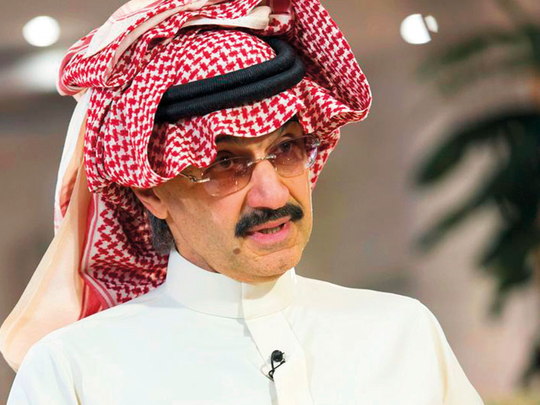
DUBAI, RIYADH: Almost two months into it, Saudi Arabia’s crackdown on corruption is yielding at least some of the $100 billion (Dh367 billion) the kingdom is targeting. Dozens of former officials and businessmen have exchanged part of their wealth for freedom.
But in the increasingly drawn-out case of Prince Al Waleed Bin Talal, the public face of the Saudi royal family to many foreign executives and investors, there’s more at stake than taking over his global business empire and talks on a settlement have hit an impasse.
Living in a hotel
Al Waleed and other remaining suspects are held at the Ritz-Carlton in Riyadh, a palatial hotel that hosted US President Donald Trump in May. No official charges have been made public against any of the detainees, who numbered 159 at a count earlier this month.
The 62-year-old nephew of King Salman used his royal wealth to invest in industries from banking to aviation, hospitality and real estate. The Wall Street Journal reported this month that authorities are demanding at least $6 billion to settle his case.
His net worth has declined by about $2 billion to $18 billion since his detention, according to data compiled by Bloomberg.
Prince Miteb, son of the late King Abdullah and the former head of the powerful National Guard Corps, was released after paying the equivalent of more than $1 billion, a senior Saudi official said last month.
“Prince Al Waleed is powerful and well-connected, but this may not end well given that he is in a battle with an even more powerful group,” said Paul Sullivan, a Middle East specialist at Georgetown University in Washington. The purge is “a harsh way to show that some of the old ways of doing business are over to a great degree,” he said.
Kingdom Holding said in a November 6 statement it had the full confidence of the Saudi government. Officials at the company didn’t respond to a request for further comment when contacted by email. The government’s Centre for International Communication said it can’t comment due to Saudi laws protecting an individual’s right to privacy.
The 32-year-old crown prince ditched the traditional Saudi decision-making process that moved at a glacial pace, but preserved consensus among the royals. His domestic efforts have been more successful than his foreign ones.
He entered into a war against pro-Iranian rebels in Yemen and led efforts to isolate neighbouring Qatar.
While pro-Saudi forces are gradually gaining ground in Yemen, rebel missiles have reached Riyadh twice in the past two months.
The kingdom was also blamed for allegedly orchestrating the resignation of Lebanese Prime Minister Sa’ad Hariri from Riyadh in November, a claim that Saudi officials and Hariri have denied.
It sparked outrage in Lebanon, a chilly reaction from Egypt and the US, and a French intervention that helped Hariri remain in office.
Key drives
At home, the prince, known among journalists and diplomats as MBS, has taken several bold measures. Security forces rounded up government critics before a decision to lift a ban on women driving in September.
The Crown Prince is also spearheading a plan to overhaul an economy too reliant on petrodollars, with the sale of a small stake in monopoly oil producer Saudi Aramco in 2018 underpinning it.
“We have reason to be more optimistic about his domestic projects than his foreign ones,” Hawthorne said.












